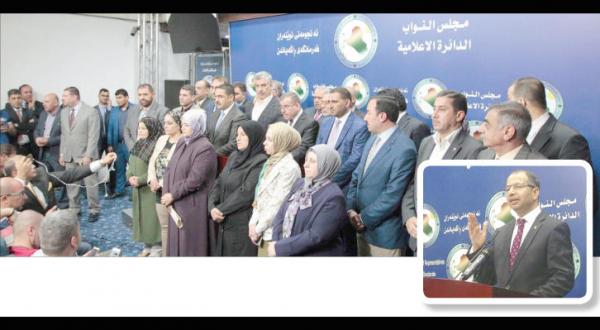Baghdad-For the first time in 13 years, 171 lawmakers protested to end sectarian and ethnic quotas within the country’s institutions. They sacked the Parliament’s Speaker, Salim al-Jubouri, and his two deputies, the Shiite Humam Hamoudi and the Kurdish Aram Sheikh Mohammed, after a vote by the lawmakers who were in sit-in protest inside the parliament’s building for the third consecutive day.
The decision was made during an emergency session of some 171 lawmakers headed by Adnan al-Janabi, an elder member of the Parliament, after the speaker Salim al-Jubouri and his two deputies did not attend the session.
At the time when controversy on the constitutionality of the meeting continues, the lawmakers affirmed that they are preparing to withdraw confidence from the Prime Minister Haider al-Abadi.
Protesting lawmakers held an emergency session Thursday and claim to have the votes needed to make quorum and oust the speaker, but the speaker’s media office has called the vote “invalid,” claiming the lawmakers don’t have the number of votes needed.
However, Jubouri’s Sunni political bloc, known as Powers Union, held a press conference immediately after the controversial session and announced its rejection to the sack, saying the session lacks quorum.
Salim al-Jabouri, the speaker, said that the dissenting MPs would be able to voice their grievances at Saturday session but he did not make it clear if Abadi will show up.
He said the protesters’ vote to remove him, which was broadcast on state TV and pan-Arab channels, was not constitutional and that he would chair the next session, threatening to go to the federal court to abolish the decision.
The sit-in lawmakers protested the repeated delay by the parliament speaker Salim al-Jubouri over a proposed vote for new cabinet candidates as part of reforms suggested by Prime Minister Haider al-Abadi.
Dissenting MPs argue that Abadi drew up his list in consultation with Iraq’s main political parties, upholding the system of ethnic and sectarian quotas in the constitution.
Legislators from various parties were demanding an end to the quota system, created following the U.S.-led invasion in 2003, according to which Iraq’s resources and control would be divided among the political parties representing Iraq’s ethnic and sectarian factions.
The Iraqi National Accord Movement, headed by Ayad Allawi, confirmed its full solidarity with the protesters in order to get rid of sectarianism and sectarian quotas.
The spokesman for the National Accord said in a statement that his movement and the “National Coalition” movement were the first to call for reforms and rejection of sectarianism, confirming that their stance is fixed and has not changed since the occupation.
He also pointed out that protests of the lawmakers completed what the Iraqi citizens have started with as they have been long calling for change, fight against corrupts and end of sectarianism.
In this matter, Haytham al-Jabouri, a spokesman for the dissenting MPs, told Asharq Al-Awsat that the protesting lawmakers decided to rebel against the ethnic and sectarian quotas that have destroyed the country and caused the situation to be unbearable, which is why we got along with people’s stance that has been rising for months against quota system in all its forms.
He added that “the first proposal for the cabinet, which was suggested by al-Abadi, was somehow reasonable, yet Salim al-Jubouri and other political bloc leaders wanted to choose ministers from their blocs and parties. Therefore, al-Abadi decided to present a new cabinet proposal including ministers from the same blocs and parties, which means that the quota system will continue to rule in this country.”
“For this reason, we decided to protest and start the reform process, commencing with ousting the Parliament’s speaker,” he added.
